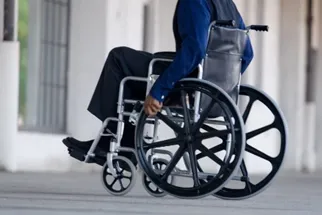How many times have you heard stand tall and not lean over? Keeping body alignment is vital so that as we age, our frame does not start to tilt over. On a visit to a nursing facility, I observed many residents in wheelchairs. I also observed the positioning of many of them. Despite the multiple reasons for wheelchair reliance, care, and concern must focus on body positioning, especially if most awake activities involve sitting in a wheelchair. Movement is still a critical component for loved ones dependent on a wheelchair. If loved ones are in placement facilities, caregivers should inquire about physical therapy and onsite activities that help with gentle body positioning exercises. So, how can you care for someone in a wheelchair at home or if placement is their status? Let’s consider poor posture.
Poor Posture
Improper positioning can cause several problems. Difficulty breathing and swallowing with the risk of aspiration (food or water going down the wrong pipe)is a significant worry. Digestion, bowel and bladder concerns, skin problems, joint pain, and, in some cases, circulation problems are real possibilities when loved ones are dependent on a wheelchair. You’ll have to adjust accordingly depending on what your loved one needs. It is also a great practice to include your healthcare practitioners’ insight.
The Right Wheelchair
Comfort and fit are the two most substantial elements of living in a wheelchair — proper fit to prevent issues like pressure sores due to limited circulation. Pressure ulcers create painful sores. They form when your skin and soft tissue press against a hard or non-giving surface. Lack of blood supply can cause the tissue in areas to become damaged or die. Seating pads for comfort are a must. Assisting someone in a wheelchair requires proper techniques and care to ensure their safety and comfort.
As Your Proactive Caregiver Advocate, I understand the challenges of caring for a loved one who uses a wheelchair. The approach to care will vary based on the needs, be they physical, emotional, or social. Proper position and alignment can help prevent pain and stiffness in the neck, back, bottom, legs, and feet. Positioning is also essential if loved ones spend the majority of their time in a wheelchair to keep their skin clean and intact. Be Safe! Be Well!
Dr. Cynthia J. Hickman is a retired registered nurse and case manager, CEO of Your Proactive Caregiver Advocate. She has released her newest book, The Essential Caregiver Training Course for Corporations and Community. From the Lens of Daughter, Nurse, and Caregiver: A Journey of Duty and Honor, and The Black Book of Important Information for Caregivers.

